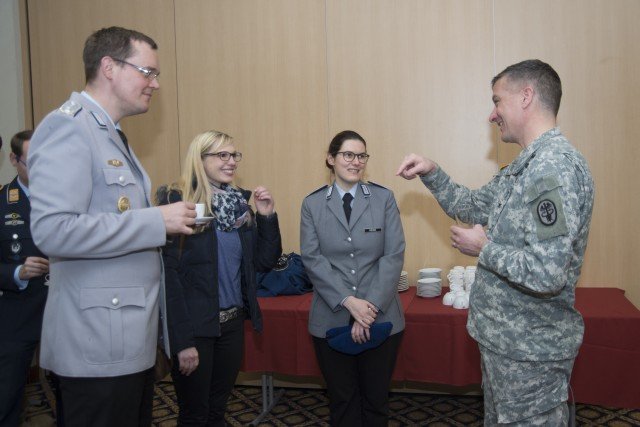
By Robyn Mack
USAG Stuttgart Public Affairs
The Stuttgart Army Health Clinic hosted German army doctors from the Bundeswehrkrankenhaus Ulm March 2 to share experiences in contingency healthcare.
The lecture and discussion focused on how to effectively manage refugees in an operational setting, as well as best practices during a public health emergency.
“We want to hear from them,” said U.S. Army Lt. Col. (Dr.) Patrick Contino, the health clinic’s medical director. “Their medical management of the refugees in Germany is something we can learn from and apply both in and outside the military environment.”
Bundeswehrkrankenhaus Ulm, the only remaining Bundeswehrkrankenhaus in southern Germany, services a combination of German armed forces and civilians. “We are the biggest clinic,” said Col. (Dr.) Peter Schmidt of the Bundeswehrkrankenhaus Ulm. “We have more than 25,000 inpatient cases annually, and over 100,000 outpatient visits.”
Like the U.S. facility, the mixed population offers a better opportunity for skills training.
“Our peacetime healthcare mission develops our skills needed for readiness,” said U.S. Army Col. Patrick Grady, the Stuttgart clinic’s commander. “By providing care to our family members, retirees, and civilians the staff is exposed complex care which enhances their skill set.”
“Like you, our daily work prepares us for the battlefield,” said Schmidt of his facility which is also the Medical Center of Ulm University and one of the top-ranking medical schools worldwide.
For U.S. Army health care professionals, “No day is ‘typical’ … [they] face the multiple challenges of war, peacekeeping, humanitarian relief and caring for Soldiers, retirees and Family members at home,” according the Army Medical Command.
“Taking a look from the outside, in, you can learn a lot,” said Capt. Michael Neunaber, an information security reservist with the Bundeswehr who is currently focusing on patient records management. “Sharing information between the cultures can spring a new idea.”
In addition to talking about operational aid, the teams focused discussions on long-term health care and education by highlighting the U.S.’s Wellness Center concept and digital patient records. The visitors also toured the renovated clinic.
